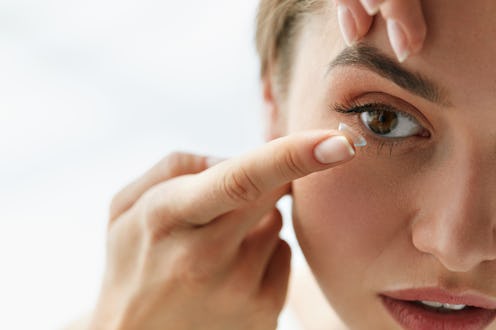For those of us who grew up wearing glasses, the day we could start wearing contacts was a day for the history books. I remember that I was in seventh grade, I felt like the star of a back-to-school episode of Degrassi, and I vowed never again to return to my purple bifocals (within a few years I absolutely did, but that's another story). But what few people tell you is just how annoying contact lenses can be. So what happens if you don't change your contact lenses enough? Well, nothing good, I'll tell you that much.
In today's optometry landscape, most people rely on a combination of contact lenses and physical glasses, providing them with variety and flexibility. But only within the past half-century have contacts hit the mainstream market. Because of their relative newness — daily disposable lenses only arrived in 1995 — and their immense ease, contacts are primed for misuse. And that misuse, unfortunately, can come with some serious side effects.
Even though glasses have been making a serious comeback — I'm in shock at the number of cute frames I can afford now, as opposed to the very bleak eye glasses landscape that was the early '90s — more than 30 million people still wear contact lenses in the United States, according to the CDC. Most of us are guilty of over-wearing our lenses, and the consequences can be grim. Here's what could happen if you don't change them when you're supposed to.
When You Wear Contacts For Too Long, You Literally Suffocate Your Eyes
Your eyeballs need oxygen, and when you don't change your contacts regularly, you are literally suffocating them. So what happens? Well, your corneas can swell, which can lead to a "corneal abrasion," i.e. a scratched cornea. This means pain and light sensitivity, in addition to a temporary "no contacts" rule.
Depriving Your Eyes Of Oxygen Regularly Can Result In An Overgrowth of Blood Vessels
When your eyes are deprived of oxygen, the blood vessels often experience a sort of "growth spurt" into the corneas in an attempt to adapt. A healthy cornea, on the other hand, has no blood vessel growth. This condition, called Corneal neovascularization, is treatable but permanent. Those blood vessels will always be there, but with controlled contact lens wear and anti-inflammatory drugs, they can be kept in check.
It Can Lead To Blurred Vision
In severe cases, the aforementioned blood vessel growth can cause irreparable damage to the cornea, which functions as the eye's clear window to the world. Not only does vision become blurred, but you'll be limited to just glasses.
Overwear Can Also Cause Eye Redness And Irritation
Wearing your contacts massively dries out your eyes, leaving them red and irritated. That irritation means your body is rejecting your contact lens. Listen to your body — it does what it does for a reason.
Dry Eyes Opens Them To Possible Infections
The not-great combination of corneal abrasions and eye irritation make you and your eyes increasingly susceptible to infection. Tears naturally defend against bacteria, viruses and fungi, so when your eyes are dry or your cornea is irritated (or both), your eyes are left with no defenses — and that can lead to eye ulcers. Usually presenting as a white or gray spot on your cornea, eye ulcers are incredibly serious and can lead to a loss of eyesight. See an eye doctor immediately if you're experiencing sensitivity to light, eye discharge, or a burning/stinging sensation.
